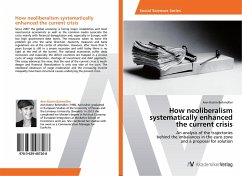
How neoliberalism systematically enhanced the current crisis
An analysis of the trajectories behind the imbalances in the euro zone and a proposal for solution
Versandfertig in 6-10 Tagen
26,99 €
inkl. MwSt.

PAYBACK Punkte
13 °P sammeln!
Since 2007 the global economy is facing major instabilities and most neoclassical economists as well as the common media associate the crisis mainly with financial deregulation and, especially in Europe, with too high government debt levels. The measures taken to solve the problem go into the same direction. Austerity measures and bank regulations are at the center of attention. However, after more than 5 years Europe is still in a severe recession and until today there is no light at the end of the tunnel. The national economies suffer deep recessions and especially the deficit countries are ...
Since 2007 the global economy is facing major instabilities and most neoclassical economists as well as the common media associate the crisis mainly with financial deregulation and, especially in Europe, with too high government debt levels. The measures taken to solve the problem go into the same direction. Austerity measures and bank regulations are at the center of attention. However, after more than 5 years Europe is still in a severe recession and until today there is no light at the end of the tunnel. The national economies suffer deep recessions and especially the deficit countries are trapped in a vicious cycle of wage moderation, shortage of investment and debt payments. This essay advances the view, that the root of the current crisis is much deeper and financial liberalization is only one side of the coin. The neoliberal obsession of wage moderation and the increasing income inequality have been structural causes underlying the present crisis.












